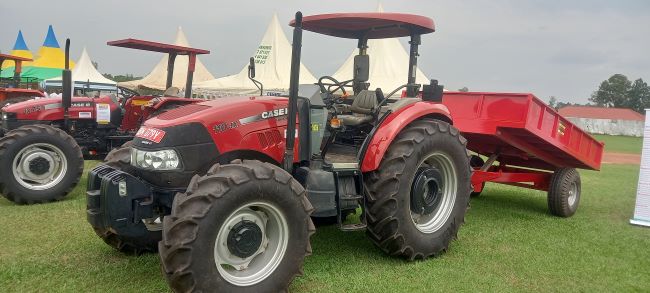GULU, July 30, 2024: Famers in northern Uganda have been urged to use cooperative societies if they are to benefit from financial support for mechanised production.
The Bank of Uganda [BoU] Agricultural Credit Facility [ACF] Officer Prosy Namala noted that while northern Uganda has plenty of land, the agricultural viability in the region needs to improve by embracing new technologies, especially used in agricultural mechanisation.
Namala was recently addressing the innovators at Gulu University at the 3rd Edition of northern Uganda Agricultural Trade Exhibition.
She noted that through cooperatives, farmers can easily acquire loans under ACF to purchase inputs and machinery at favourable prices, which individual farmers may not be able to afford.
She added that, while farmers from other regions have embraced agricultural loan schemes, northern Uganda which land available is lagging behind.
Namala however explained that BoU has relaxed access loans for farmers while the annual interest rate stands at 12 percent for the borrowers.
“When the north has plenty, the Country won’t lack food and we want to unlock this opportunity to support these small-scale farmers and turn them to commercial farming,” she added.
On his part, Regional Manager Uganda Development Bank [UDB] Gulu Branch, Sammuel Baker Ongom disclosed that for a period 9 months that UDB has operated in Gulu, Shs 125 billion has been disbursed to the farmers.
He said the loans were to activate the agri-entrepreneurship in the region as well as supporting the small-scale businesses in the subsistence economy to transition to the money economy.
“We think it’s the time to build up the food system in northern Uganda and transform its population from rural economy to money economy,” added Ongom.
He adds that, by empowering Ugandans economically, government will have widened its tax base, which is a source of revenue that government uses to fund its priority programmes.
Grace Musimami, the Principal Secretary for National Agricultural Advisory Services [NAADS] commended government for providing UDB with the funds to support agricultural enterprises in the country.
He noted that lack of financial support to farmers has slowed down growth in value addition where farmers have always been exploited as they sell their products cheaply to middlemen.
On his part, the undergraduate fourth year student of Science in Agriculture at Gulu University, Ismail Tabu, who deals with fruit processing urged UDB to relax conditions for loan acquisition for the young innovators.
The Vice Chancellor Gulu University Prof. George Openjuru Ladaa noted that the institution is deeply rooted in promoting innovations, research and value addition through its training modules.
He noted that while Gulu University is committed to transforming the agricultural sector in the northern region, there is a need for supporting the young innovators through loans for business incubation.
In the same, State Minister for Northern Uganda Dr. Kenneth Omona has asked banks to invest in agriculture through provision of loans to the rural farmers.
Omona noted that once the youth are supported with start-up capital for farming, the country will potentially address unemployment because of a huge opportunity for self-employment in the agriculture sector.
“Agriculture gives us 24 percent of our economic growth per annum and we want to take it further because we have seen other nations develop through unlocking their agricultural potentials,” Omona added.
He however revealed that the government is in the final stages of engaging the Uganda Coffee Development Authority [UCDA] for supply of coffee seedlings in the region as part of turning the region into a cash crop economy.
“I have moved to a number of places where you find people planting coffee toward the end of the second season. It may have a lot of rain but followed by severe drought,” added the minister.
He further noted that once farmers are not technically advised, they will continue making losses and run away from producing one commodity to another. Such practice, the minister said, is not good to sustain the market because of the limited supply, adding that there is a need to stop migratory farming.
Recently, the Chief Coordinator Operation Wealth Creation Gen Salim Saleh raised concern of wastage of coffee seedings supplied in the region in the recent past
Buy your copy of thecooperator magazine from one of our country-wide vending points or an e-copy on emag.thecooperator.news
